Thyssenkrupp shares are posting impressive gains amid a seemingly contradictory corporate stance. The German industrial conglomerate finds itself navigating two divergent paths: vigorously contesting EU climate regulations while simultaneously positioning itself as a future leader in green hydrogen technology. This fundamental dichotomy is currently defining both its strategy and market performance.
Regulatory Resistance and Climate Policy Challenges
From its core steel operations, Thyssenkrupp has launched a direct challenge against Brussels’ emissions trading system. The company is advocating for significant modifications to current climate regulations, specifically calling for:
- A more gradual reduction in available CO₂ emission allowances
- An extension of the timeframe for issuing carbon certificates
- Substantial relief from current carbon pricing mechanisms
This assertive stance emerges not from weakness but from substantial ongoing investment. Thyssenkrupp is currently channeling billions into decarbonizing its steel production facilities. Their strong opposition highlights the immense financial pressure that European climate mandates are placing on heavy industry, even on companies actively pursuing green transitions.
Hydrogen Subsidiary Ignites Market Enthusiasm
Despite this regulatory friction, investor sentiment remains decidedly positive. The primary catalyst behind this optimism stems not from the steel division but from Thyssenkrupp’s subsidiary, Nucera.
Should investors sell immediately? Or is it worth buying Thyssenkrupp?
Market speculation about a potential major contract for its green hydrogen production technology has significantly boosted buying interest. Although the project remains in early development phases, it underscores the vast market potential investors see in Thyssenkrupp’s hydrogen business. This segment showcases the company’s innovative profile as a technology pioneer, contrasting sharply with its traditional image as a heavy-industry stalwart.
Market Performance Reflects Dual Identity
Thyssenkrupp’s stock performance vividly illustrates this corporate dichotomy. Since the beginning of the year, the share price has surged by over 127%. Even after recent consolidation phases, the stock continues to trade well above its 200-day moving average.
However, this impressive growth comes with notable volatility, with readings exceeding 45%. This heightened volatility indicates the emotionally charged nature of current trading activity, as investors weigh the company’s defensive traditional business against its promising future ventures.
The central question remains whether Thyssenkrupp can successfully balance these opposing forces: resisting stricter climate policies while simultaneously seeking to profit from the energy transition. For now, the market appears confident that both strategies can coexist, betting that the company can navigate its present challenges while capitalizing on future opportunities.
Ad
Thyssenkrupp Stock: Buy or Sell?! New Thyssenkrupp Analysis from February 7 delivers the answer:
The latest Thyssenkrupp figures speak for themselves: Urgent action needed for Thyssenkrupp investors. Is it worth buying or should you sell? Find out what to do now in the current free analysis from February 7.
Thyssenkrupp: Buy or sell? Read more here...













